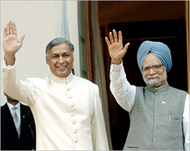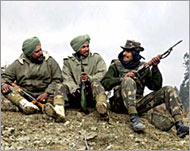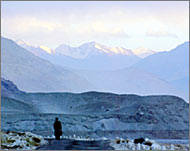Cautious optimism fills air of Kashmir
Passion for a resolution of the Kashmir problem in line with the wishes of the people is strong in the capital city of Pakistani-administered Kashmir.

But for now it is the proposal for reopening traditional travel routes across the de-facto border, that is firing public imagination in the province Pakistan calls Azad Kashmir.
In common with their brethren living on the Indian side of the border, Kashmiris of Muzaffarabad, Mirpur and remote towns like Chinari, Chakothi and Gilgit – visited by this correspondent over the past fortnight – overwhelmingly support the idea of easier travel between the two sectors of divided Kashmir.
Kashmiri families separated as a result of the subcontinent’s 1947 partition or the three wars India and Pakistan have since fought, are eager to be on the first bus that runs between Srinagar and Muzaffarabad, the two principal cities of the divided Himalayan state.
Circuitous route
The bus service is aimed at bringing together just such people: families that have been cut off from each other for decades during which they have relied solely on postal mail to keep in touch despite their close physical proximity. Often these letters do not reach their addressees.
Moreover, since the separatist campaign exploded on the Indian side of the state in the late 1980s, is has been impossible to make telephone calls to Pakistan or the portion of Kashmir administered from the Indian side.
 |
|
Muzaffarabad city sits at Jhelum |
Up until now, for residents of Indian-administered Kashmir, the only way to establish closer contact with their relatives and friends in Pakistani-administered Kashmir has been to visit New Delhi to complete visa and other formalities, then travel to Wagah, the only land crossing between India and Pakistan.
From Wagah, the visitors move to the bustling city of Lahore, and thereafter to capital Islamabad before finally entering Azad Kashmir province.
Access by road to Gilgit and the Baltistan region of the former Jammu Kashmir state, called Northern Areas by Pakistan, is rather difficult.
Special permit
Against this bleak backdrop, the news from New Delhi that talks between Indian and Pakistani officials on starting the bus service have made some headway, has understandably brought cheers from the local population.
On Wednesday India proposed that special entry permits be issued to people wanting to use the Srinagar-Muzaffarabad bus service.
|
“We’ve been pleading … that Kashmir is not Mir Gulam Rasul, |
The passport would be used only as an identification document.
The use of special permits would mean that visas on the passport will not be stamped. In any case, neither nation recognises the Line of Control (LoC) as the inter-national border.
The two countries had agreed to start the bus service when Pakistani Prime Minister Shaukat Aziz visited India, but there were differences of opinion on the travel documents to be used by the passengers.
Pakistan wants an alternative arrangement, such as having the local police or civil administration issue travel permits.
Bus-service flipside
Be that as it may, many people in Pakistani-administered Kashmir are apprehensive that the bus service, once operational, would dilute the Kashmir issue.
“We’ve been pleading before the two countries and the international community at large that Kashmir is not only a political issue but also a human problem as tens of thousands of families stand separated for decades,” Mir Gulam Rasul said.
 |
|
The Aziz-Manmohan meeting has |
He is originally a resident of Srinagar who was stranded in Muzaffarabad when the first Kashmir war broke out in 1947.
Gulam Rasul’s worst fear is that the bus service could dilute the passion for Kashmir’s secession from India.
It is not just people on the Pakistani side who harbour such misgivings. Two key leaders of the Kashmiri separatist campaign, Sayid Ali Shah Jilani and Muhammad Yasin Malik, too opposed the bus-service proposal at a meeting in New Delhi in November with Prime Minister Aziz.
Their plea was that it would ultimately transform the LoC, the de facto border that splits Kashmir between Indian- and Pakistani-administered parts, into a permanent border.
“Hence the core issue of Kashmir would be eclipsed,” Yasin had said. To which Ali Jilani had added, “It will be detrimental to our freedom struggle.”
Many people in Pakistan-administered Kashmir are of the opinion that unless India “offers Kashmiris relief from their suffering” and “gives up its rhetoric”, the ongoing peace process with Pakistan will not succeed.
Curse of fate
Muzaffarabad is situated at the confluence of the Jhelum and Neelam rivers and is about 140km from Islamabad, the capital of Pakistan.
From here, Srinagar is only 186km. Kashmiris curse their fate that they have to traverse hundreds of miles through Pakistan and India and virtually beg for visas to travel between the two parts of their province.
 |
|
As a goodwill gesture, India has |
Cradled by lofty mountains, Muzaffarabad is a blend of different cultures and languages.
Neelam, known as Kishan Ganga across the Line of Control, gushes through this commercial hub of Pakistani Kashmir before joining the Jhelum at Domel.
The two rivers together play a dominant role in the microclimate of Muzaffarabad and its neighbourhood.
“Can India and Pakistan learn a lesson from it?” Raja Muhammad Farukh Haider Khan, political analyst and aide to Azad Kashmir Prime Minister Sikandar Hayat Khan, wondered aloud.
Caught in crossfire
Farukh had organised a meeting of local intellectuals with the visiting Indian journalists. And much grief was expressed over the division of Kashmir and the resultant human suffering,
Farukh was in tears as he recalled that he was unable to travel across the border to attend the funerals of relatives in recent years, to say nothing about joining his dear ones on happy occasions such as weddings.
|
“There can be no Chaudhary Muhammad Yasin, |
“I was helpless,” he said, pleading that Kashmir was more a human problem than political one, hence should be treated as such by India and Pakistan.
Saleema Atta, a retired professor, said the people of Kashmir were caught in a crossfire between India and Pakistan.
Asked if he favoured India and Pakistan going through more confidence-building-measures before taking up separately the Kashmir issue, Atta was joined by many others in saying a loud “No”.
Farukh added, “That is unacceptable. We can’t wait. And let me tell you, if my home is burning, I wouldn’t spare yours.”
‘Evolve consensus’
That being said, Ashfaq Kiyani, a local attorney, described the current joint peace initiatives as an “ice-breaking event”, and our visit to Pakistani-administered Kashmir – organised by the South Asian Free Media Association – as the first serious step towards resolving the territorial dispute.
“We know you are in a position to make our views known to the other side,” he said.
 |
|
Free movement across the Line |
Kiyani strongly pleaded for allowing other important sections of Kashmiri society, such as lawyers and doctors, to cross the border. “That would help us to evolve a consensus on major issues.”
Both politicians and commoners of Azad Kashmir expressed the view that the state as it existed prior to the first Indo-Pak war of 1947-48 should not be divided permanently.
But till the problem is resolved, they want free movement across the LoC to enable reunions between Kashmiri families forced into a divided existence by wars and government red tape.
“Khoni lakeer ko mita do (Erase the bloody line)” is most favourite slogan of the people of Pakistani-administered Kashmir. And merely starting a bus service between Srinagar and Muzaffarabad will not do, they add.
They say similar services should be made available at the other known crossing points along the 716km long de facto border and beyond.
Incidentally, New Delhi and Islamabad have both acknowledged the reality of human suffering and agreed in principle to this demand.
Need for dialogue
Underscoring the need for greater involvement of Kashmiris in the dialogue between India and Pakistan, Chaudhary Muhammad Yasin, secretary-general of Pakistan Peoples’ Party (Azad Kashmir), said political disputes, if not resolved, lead to militancy.
He said, “There can be no solution over the heads of we the Kashmiris.”
 |
|
Bus service would make it easier |
For his part, Majeed Malik, a retired chief justice Azad Kashmir province who heads the Jammu & Kashmir Liberation League, stressed the need for “people-to-people dialogue” on either side.
“The people of Kashmir are a family who have a country,” he said.
He would not rule out possibility of Kashmir becoming an independent, sovereign state, rejecting the argument that such an option would not be viable since the territory is landlocked.
“If we are a liability, leave us alone,” he said, adding that Kashmir has tremendous mineral and water resources on which it could survive and that the two countries were “sitting on a treasure of gold”.
It was for the people of Kashmir to decide, he said, “but I think Kashmir must remain intact”.
A Muslim cleric and head of the Jamiat-e-Ulema, Jammu and Kashmir, Pir Atiqur Rehman, said the ideal solution would be to hold a plebiscite as is envisaged by the relevant resolutions of the UN Security Council.
But since India and Pakistan hold seemingly irreconcilable positions on the issue, the way out was to settle it on table after taking the people of Kashmir into confidence. “Both India and Pakistan ought to create conditions for that,” Pir Atiqur said.
Formula floated
Chaudhary Hamid Nasir Chattha, chairman of the special committee of the Pakistani parliament on Kashmir, said he objected to any proposal that would seek the division of Jammu and Kashmir along regional, ethnic or linguistic lines.
“The people of Majeed Malik, |
However, he also considers Pakistan’s official stand on Kashmir as non-negotiable. He says, “Our country can’t deviate from its position.”
Chattha was replying to the query if President Pervez Musharraf’s recently floated formula – identifying the seven regions of Jammu and Kashmir in line with their cultural and ethnic backgrounds for demilitarisation – could provide a possible solution.
Saying that India and Pakistan were entitled to hold different viewpoints on Kashmir, Chattha said the way to resolving the issue was to hold the promised plebiscite.
But in view of the changing world scenario and the two countries’ will to seek an amicable solution to their problems, they should hold composite and result-oriented dialogue, he said.